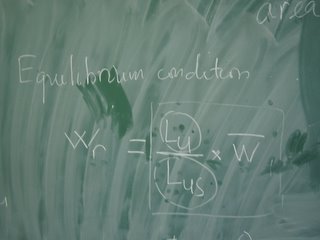Todaro's Migration Model


Thang explained this model to me today, he has to give a presentation to his Macro class and he wanted to see if he could make it comprehensible in English.
This model purports to explain the pattern of migration from rural areas to urban areas. In developing economies, rural workers who consider themselves to have high human capital flock to the city. (The streets are paved with gold, you know.)
If they are unable to find work in the formal urban economy, they either end up in the informal urban economy, or unemployed. In Vietnam, the wages are highest in the formal economy, lowest in the rural economy, and the informal urban economy, or what we would call the underground economy, they are somewhere in the middle. We think. Who would know what they really are?
What should the government should do about the informal economy? The literature suggests that people would prefer the higher wages and legitimacy of the formal economy, but there are not enough jobs to go around.
The informal economy isn't all bad news. On the upside, it means people are working and this increases welfare and avoids social problems. On the downside the government is not collecting any tax, except for VAT.
No taxes, no improved infrastructure, no welfare, less unemployment.
Half a loaf is better than no bread.

